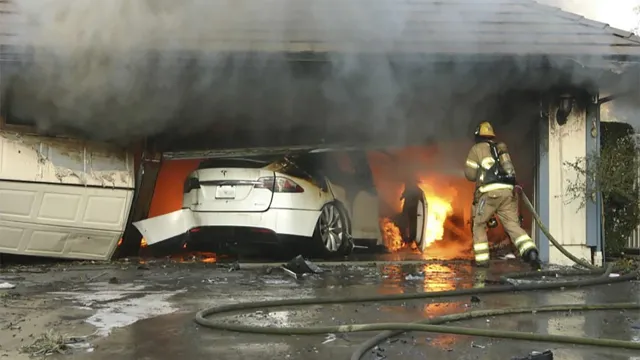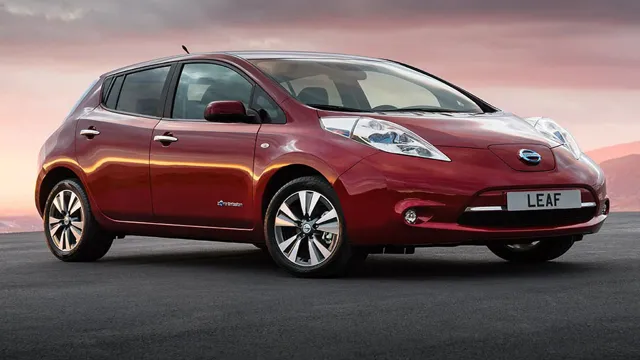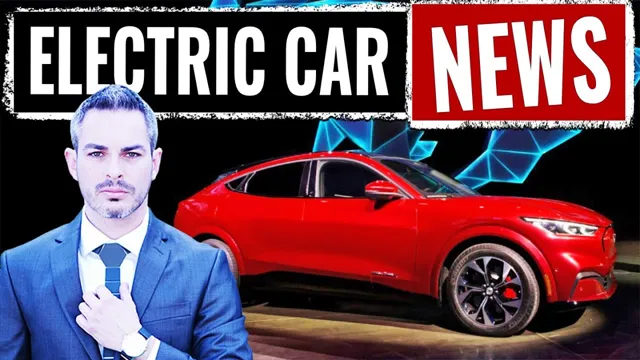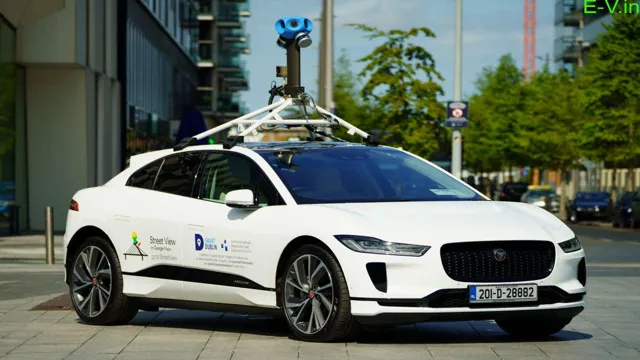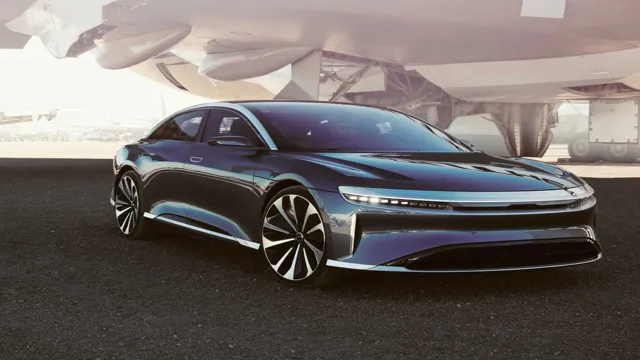Shock and Fire: Latest Update on Electric Car Incidents
Electric car fires have become a topic of concern in recent years, with headlines reporting fiery accidents involving these eco-friendly vehicles. While electric cars promise a greener future, the possibility of fires has raised some questions about their safety. Are these vehicles more prone to catching fire than their gas-powered counterparts? What causes electric car fires, and how can they be prevented? In this blog, we dive into the world of electric car fires, exploring the science behind them and what measures manufacturers are taking to keep drivers safe on the road.
Whether you’re a current electric car owner or simply interested in the technology, read on to learn more about this hot topic.
Overview of Recent Incidents
Recent news of electric car burning incidents has caused concern among consumers and car manufacturers alike. In the past few weeks, several electric car accidents have resulted in vehicles catching fire and causing significant damage. One notable incident occurred in China, where a Tesla Model S caught fire and burned for several hours, despite the efforts of firefighters to extinguish the blaze.
Another incident, in Austria, involved a parked electric vehicle catching fire and causing explosions that damaged nearby cars. While these incidents are relatively rare, they highlight the potential dangers of high-voltage batteries in electric cars. Manufacturers are now working to improve safety features and develop new technologies that can minimize the risk of battery fires.
Despite the challenges involved, the trend towards electric vehicles is expected to continue, with many consumers and governments prioritizing sustainability and reducing emissions.
Tesla Model S in Florida, China, and Austria
Recently, there have been several incidents involving Tesla Model S in different parts of the world. In Florida, a man died after crashing into a tree at high speed while driving a Tesla Model S. According to the National Highway Traffic Safety Administration (NHTSA), the car was on autopilot mode when the accident occurred.
Meanwhile, in China, a Tesla Model S caught fire while parked in a garage. The cause of the fire is still under investigation. In Austria, a Tesla Model S was involved in a collision with a tractor-trailer, injuring the driver.
These incidents raise questions about the safety of Tesla’s autopilot mode and the reliability of the Model S. While the autopilot feature is designed to assist drivers, it is not meant to replace them entirely. It is important for drivers to pay attention to the road and be aware of their surroundings, even when the autopilot mode is engaged.
As Tesla continues to introduce new features to its vehicles, it is crucial that safety remains a top priority.
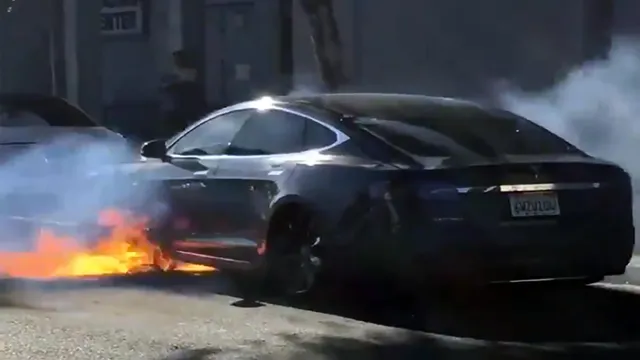
Chevrolet Bolt in Michigan
The Chevrolet Bolt is an electric vehicle that boasts of its efficiency and sustainability. However, recently, in Michigan, there have been reports of Bolt-related incidents that have raised concerns among vehicle owners. One of the most recent incidents involved a Bolt vehicle that caught fire while charging in a garage.
This incident resulted in the destruction of the garage and damage to a nearby vehicle. Another incident involved a Bolt that caught fire while it was parked in a driveway, resulting in the destruction of the vehicle and damage to the driveway. These incidents have led to investigations to determine the root cause of the fires and to ensure the safety of Bolt owners.
The National Highway Traffic Safety Administration (NHTSA) has reported that most of the incidents involve Bolt vehicles manufactured between 2017 and 201 As such, Chevrolet has issued a recall of all Bolt vehicles manufactured during this period to replace the high-voltage batteries. The recall serves as a safety measure to prevent further incidents.
While it is unfortunate that these incidents have occurred, it is essential to remember that following safety precautions when using electric vehicles is vital. Always follow charging protocols, and if you notice any abnormalities in the functioning of your vehicle, seek professional help immediately.
Causes and Prevention Measures
The news of electric car burning has become a cause for concern among car owners and manufacturers alike. While such incidents are rare, they do happen from time to time. One of the main causes of electric car fires is the battery pack overheating.
This can occur due to a number of reasons, such as faulty wiring or the battery being damaged. To prevent such incidents, manufacturers are incorporating better cooling systems and using new battery technologies that are less likely to overheat. It’s also important for car owners to make sure their vehicles are maintained properly and not used beyond their intended capacity, as this can also contribute to overheating and potentially catastrophic outcomes.
As electric cars become more popular, it’s important for both manufacturers and users to remain vigilant and take proactive measures to prevent fires and other potential hazards.
Battery Malfunction and Overheating Risk
Battery malfunction and overheating risk are serious issues that can lead to safety hazards. There are different causes of battery malfunctions and overheating, including overcharging, exposure to heat, and physical damage. Overcharging your battery can cause it to overheat, which can lead to damage to the battery’s internal components and over time, reduce its lifespan.
Exposure to heat can also damage your battery, especially if it is left in a hot car or exposed to direct sunlight for prolonged periods. Physical damage, such as dropping your device, can also cause battery problems. To prevent these issues, you should always use the original charger that came with your device, monitor your device’s temperature and try to avoid exposing it to heat or direct sunlight.
Also, be careful not to drop your device or subject it to other types of physical damage that can cause battery problems. By taking these preventive measures, you can avoid battery malfunctions and overheating and ensure your device’s longevity and safety.
Manufacturers’ Response and Recall Actions
When a product recall occurs, manufacturers must act quickly to address the issue and prevent further harm to consumers. Causes of product recalls can vary, but some common factors include manufacturing defects, design flaws, and safety concerns. To prevent such recalls, manufacturers need to implement more thorough quality control measures throughout the production process.
They can also work closely with regulatory agencies to ensure compliance with safety standards and regulations. In the event of a recall, manufacturers must communicate the issue clearly and efficiently to the public, leveraging various channels such as social media and press releases to spread the word. They should provide clear instructions on what consumers should do, whether that means returning the product or seeking medical attention.
In taking these actions, manufacturers can ensure that their products meet the highest standards of safety and quality, while minimizing the risk of future recalls and protecting the health and well-being of consumers.
Safe Charging Practices for Electric Cars
Electric cars are quickly becoming more prevalent on our roads, and with this rise in popularity comes the need to ensure proper charging practices. One of the major causes of issues with electric car charging is overheating. This can happen when the car’s battery is charged too quickly or when it is charged for too long.
To prevent this, it is important to regularly inspect the charging process and use a charging cable that is compatible with your vehicle. Additionally, it is vital to charge the car in a well-ventilated area to reduce the risk of overheating. Another potential cause of charging issues is a lack of proper maintenance for the charging station.
Regular cleaning and inspection of charging equipment can go a long way in preventing malfunctions and ensuring a safe charging experience. By implementing these prevention measures and staying aware of potential issues, you can have peace of mind knowing that your electric car is being charged safely and efficiently.
Future of Electric Car Safety
As electric cars become more popular, there has been increasing concern over reports of electric cars catching fire. However, it’s important to remember that all cars have the potential to catch fire, and electric cars are not inherently more dangerous than gasoline-powered cars. In fact, electric cars have several safety features designed to prevent fires, such as fire-resistant battery packs and automatic shutoff systems.
Additionally, there have been advancements in technology to detect and prevent any issues that could lead to fires. With continued research and innovation, the future of electric car safety looks promising.
Advancements in Battery Technology and Safety Standards
The future of electric car safety rests on two major factors: advancements in battery technology and safety standards. Without these, electric cars could pose significant risks to both drivers and passengers. Fortunately, innovations in battery technology are making electric cars safer than ever before.
One such advancement is the use of solid-state batteries, which eliminate the liquid electrolytes used in many traditional batteries. This not only makes the batteries more stable but also reduces the risk of fire or explosion in the event of a crash. Additionally, safety standards are being developed and implemented by organizations such as the National Highway Traffic Safety Administration (NHTSA) to ensure the consistent safety of electric vehicles.
These standards cover everything from battery design and installation to crash safety and emergency response procedures. As electric cars become more widespread, it is essential that safety remains a top priority, and advancements in battery technology and safety standards will play a significant role in achieving this.
Impact on Electric Car Market and Consumer Perception
The future of electric car safety is bright and full of potential. With advancements in technology and increased awareness surrounding these vehicles, manufacturers are stepping up their game to prioritize safety measures. From reinforced body structures to autonomous driving features, electric cars are quickly becoming among the safest vehicles on the road.
As a result, there is a growing sense of confidence in the electric car market and consumer perception is changing. Drivers are no longer hesitant to make the switch from traditional gasoline-powered cars to electric vehicles. Manufacturers have also recognized that safety is a top concern for consumers and are working hard to continue improving measures.
The future of electric car safety is promising, and we can expect to see continued advancements in the coming years.
Conclusion
In conclusion, while the news of an electric car catching fire may be concerning, it’s important to remember that such incidents are incredibly rare and occur at a much lower rate than traditional gasoline-powered vehicles. Plus, let’s be real: if we freaked out every time a car caught on fire, we’d never leave our houses. So, let’s continue to embrace the electric car revolution and focus on the incredible benefits they bring to both the environment and our wallets.
And if something does happen to go wrong, just call Tesla; their customer service is out of this world.
FAQs
What happened to the electric car that caught fire?
There have been several reported incidents of electric cars catching fire, with investigations ongoing to determine the cause.
Are electric cars more likely to catch fire compared to gasoline cars?
No, statistics have shown that electric cars are actually less likely to catch fire than gasoline cars.
What safety measures are in place to prevent electric car fires?
Electric car manufacturers have implemented various safety measures, such as thermal management systems and battery pack designs, to prevent fires from occurring.
How can drivers reduce the risk of an electric car fire?
Drivers can reduce the risk of an electric car fire by properly maintaining their vehicle, avoiding extreme temperatures and charging conditions, and following the manufacturer’s guidelines for charging and storage.
